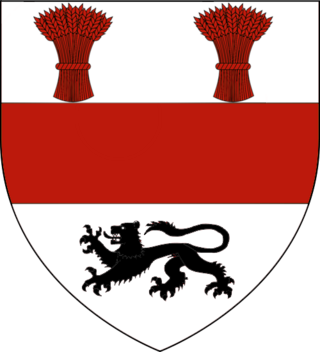Kehoe, originally spelled MacKehoe (from Irish Mac Eochaidh 'son of Eochaidh', a personal name based on each 'horse'), is an Irish surname that stems from several distinct septs in Ireland.
The most notable branch were from southeastern Ireland in the province of Leinster and are descended from Brandub mac Echach, King of Leinster, in the 6th century AD. This branch were the Chief Filí of Leinster up until the 17th century and inaugurated the Kings of Leinster upon their stone called Leac Mhic Eochadha ("Eochaidh's flagstone").
Another unrelated and separate branch, descends from King Domnall Mór Ua Cellaigh of the O'Kellys of Uí Maine, who died in 1221.
Many of their descendants have emigrated to America and have spread throughout that part of the world. The name is spelled in a variety of ways, however the most common are Kehoe, Keogh and Keough . In Ireland the Kehoe version is used most often in and around County Wexford while Keogh is more common throughout the rest of the country.
McDonough is an Irish surname.
Cooke is a surname of English and Irish origin derived from the occupation of cook and anglicisation of various Gaelic names. Variants include Cook and McCook.

Kinsella is a surname of Irish Gaelic origin, developed from the original form Cinnsealach, meaning "proud". The Kinsella sept is native in part of the modern County Wexford in Leinster, a district formerly called the Kinsellaghs. The oldest documentary mention of the surname appears in the Ancient Records of Leinster, dated to 1170, where the son of the King of Leinster is named as Enna Cinsealach. Originally pronounced KIN-səl-ə, it is also often found pronounced kihn-SEL-lə. This surname is most often found in Ireland, Northern Europe, Australia and New Zealand.
Clancy is an Irish name coming from the Gaelic Mac Fhlannchaidh/Mac Fhlannchadha, meaning "Son of the red/ruddy warrior", or as a hypocorism for Clarence. The surname originated from two different families, one in Thomond and one in the present day County Leitrim.

The surnames McCabe and MacCabe are Irish and Scottish surnames. McCabes are considered to have moved from the Western Isles of Scotland to Ireland sometime around 1350. McCabes are now found mostly in the United States, Ireland and the United Kingdom, Australia, South Africa, and New Zealand.
MacDonnell, Macdonnell, or McDonnell is a surname of Irish and Scottish origin. It is an anglicized form of the Gaelic patronymic Mac Dhòmhnaill, meaning "son of Dòmhnall". The Gaelic personal name Dòmhnall is a Gaelicised form of the name Donald, which is composed of the elements domno, meaning "world", and val, meaning "might" or "rule". The name is considered a variation of MacDonald.

Kavanagh or Kavanaugh is a surname of Irish origin, Caomhánach in Irish. It is one of the few Irish surnames that does not traditionally have an O or a Mac in either English or Irish.
Ryan is a common surname of Irish origin, as well as being a common given name in the English-speaking world.
Dowling is an Irish surname. It is an anglicised form representing two unrelated clans:

Burke is a Norman-Irish surname, deriving from the ancient Anglo-Norman and Hiberno-Norman noble dynasty, the House of Burgh. In Ireland, the descendants of William de Burgh had the surname de Burgh, which was gaelicised in Irish as de Búrca and over the centuries became Búrc, then Burke, and Bourke.
Kehoe is an Irish clan name.
Crowley is an English and Irish surname, which was traditionally pronounced in English but is now often pronounced. In England, it is a habitational surname, meaning referring to someone who lived in or nearby a meadow of crows.
Cleary is an Irish surname, which derives from Gaelic Ó Cléirigh/Mac Cleirigh, meaning 'descendant or son of cleric'. Notable people with the surname include:
Keogh is an Irish surname. It is a reduced Anglicized form of the Gaelic Mac Eochaidh or MacEochaidh, 'son of Eochaidh'. The personal name Eochaidh is in turn based upon the Gaelic word for horse.

McKeogh is an Irish surname. Spelling variations include: MacKeogh, McKeough, Keogh Kehoe, McCaughey and Hoey, among others. Modern spelling comes from the original Mac Eochaidh.
McKeough is a surname. Notable people with this surname include:
Hoy is a Scottish and Irish surname. The Irish origin of the name is derived from "Ó hEochaidh". Other surnames developed from "Ó hEochaidh" include: McKeogh, Kehoe, Hoey, Haughey, Haugh and Hough. Hoy is sometimes considered to be a variant of Haughey, and it is very common in Ulster. The first recording of the surname in Ireland is of one Elizabeth, daughter of Leuise and Martha Hoy, on 8 February 1646, at Holy Trinity (Christchurch), Cork.
Keough is a surname from Ireland. Notable with the name include:
Keohane may refer to:
Keoghan is a surname. Notable people include: